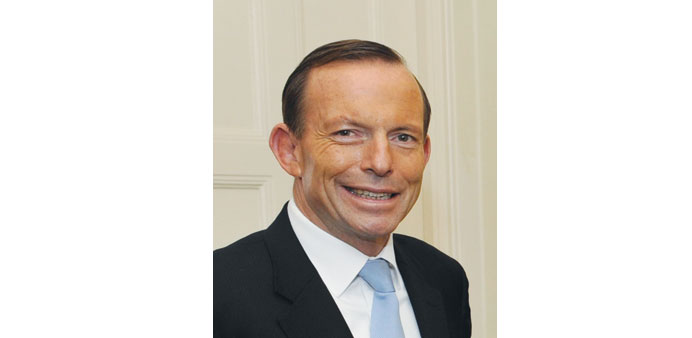AFP/Sydney
Prime Minister Tony Abbott said yesterday it would be best to restore Australia’s relationship with Indonesia “as quickly as possible” as the bodies of two drug traffickers executed two days before were set to return home.
Canberra withdrew its ambassador to Jakarta after Andrew Chan, 31, and Myuran Sukumaran, 34, were executed by firing squad along with six others on Wednesday despite a storm of international criticism and pleas from their families.
“Despite the difficulties of the last few days, despite the very understandable anger that so many Australians feel, in the end, it is in everyone’s best interests that this relationship can be restored as quickly as possible,” Abbott said.
Abbott said it was an encouraging sign for the relationship that Indonesia’s ambassador in Canberra, Nadjib Riphat Kesoema, had expressed sympathy for the families of those executed.
“It’s a sign that decent people in Indonesia appreciate the anger that Australians feel at these cruel and unnecessary deaths,” Abbott told reporters in Canberra.
“And it’s a sign that, in time, the good and strong friendship between Australia and Indonesia can be resumed.”
Kesoema said in a statement late Thursday that “the Indonesian people and government express our sympathies to the families and friends of the deceased”. The ambassador added that good relations with Australia were important to his country, and Jakarta remained strongly committed to improving and strengthening the overall relationship.
Abbott said while it was a difficult moment in the Australia-Indonesia relationship, he was confident that both countries would do what was necessary to rebuild ties between the nations, which are key allies in counter-terrorism efforts.
Indonesia is also a significant economic partner for Australia, with two-way trade in goods and services reaching Aus$14.9bn ($11.8bn) in 2013.
Abbott has stressed the importance of building trade ties with Indonesia, which he has said is the most important country to Australia due to its size, proximity and developing power. Australia’s Foreign Minister Julie Bishop said while the executions were deeply regrettable, it was “time for us to seek to move on”.
“I spoke to the family members last night and they are devastated and one can’t help but feel so deeply for what they are going through,” she told reporters. “But we must focus on the long-term relationship with Indonesia.”
Jakarta’s execution of eight death row prisoners — seven foreigners and one Indonesian — drew worldwide condemnation with UN chief Ban Ki-moon expressing deep regret.
But Indonesia defended the killings of the two Australians, a Brazilian, four Nigerians, and one Indonesian as vital for its “war” on drugs. In Australia, where the bodies of Chan and Sukumaran were expected to return today, a portrait of Indonesian President Joko Widodo, who refused pleas for clemency from the men, was taken down from the National Portrait Gallery in Canberra.
Bishop said it was time for a regional discussion about the death penalty, particularly given there were indications of “considerable disquiet” in Indonesia on the issue.
Widodo’s political opponent Prabowo Subianto reportedly wrote to the president over the weekend to plead for mercy for the Australians, ringleaders of a gang that attempted to smuggle heroin out of Indonesia.
Prabowo reportedly said if the president were to “postpone the executions indefinitely” he would support him.
Abbott said he deeply regretted that Australia’s representations against the death penalty were not successful.
“We made every effort —through official channels, through unofficial channels, publicly and privately — to appeal to the better angels of their natures,” he said.

Abbott: keen to restore ties
